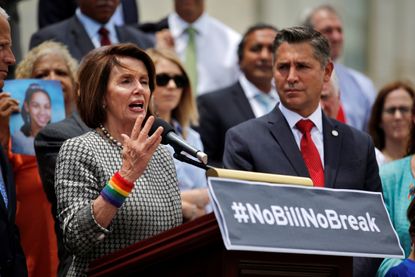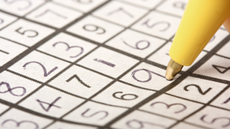House Democrats' sit-in wasn't really about guns. It was about identity politics.
This week's buzzy demonstration on the House floor says a lot about how progressives and conservatives see the world


This week, House Democrats staged a 25-hour sit-in — wherein they literally sat on the floor of the House of Representatives — to get their way on gun control, calling for a vote on the so-called "No Fly No Buy" law that would prevent people on the no-fly list from being able to buy a gun.
A sit-in! How exciting! I remember the last time I attended a sit-in: It was when my daughter was absolutely adamant that she should get more dessert.
This whole thing was a farce. Journalist Michael Tracey had it right: "Dems are ginning up emotions over gun violence in support of an authoritarian measure that they know full well won't pass. It's craven. They are poisoning the debate, inflaming cultural resentment, and lessening the likelihood that anything meaningful will be done. It's a transparent election year ploy dressed up as principled resistance."
Subscribe to The Week
Escape your echo chamber. Get the facts behind the news, plus analysis from multiple perspectives.

Sign up for The Week's Free Newsletters
From our morning news briefing to a weekly Good News Newsletter, get the best of The Week delivered directly to your inbox.
From our morning news briefing to a weekly Good News Newsletter, get the best of The Week delivered directly to your inbox.
Nonetheless, many progressives gloated over the fact that liberal congressman and civil rights hero John Lewis was leading the sit-in. (The irony is that Lewis himself was once on the no-fly list.) But until very recently, progressives lambasted the no-fly list as an abomination, a secret list of disproportionately brown enemies drawn up incompetently and without due process. As a civil rights hero, Lewis should be wary of secret government lists. Let's not forget that, among gun owners who were on government watchlists, we can name none other than Martin Luther King, Jr.
Many progressives realize this is a bad hill to die on. It's foolish politically, and it's bad on the policy merits. These sorts of theatrics make progress, as gun controllers define it, less likely. But the debate has nothing to do with gun violence, and everything to do with identity. It's about the kind of person you are, and what you value. That's why it's so impossibly angry, so impossibly fraught. That's why people are picking exactly the wrong hills to die on.
Many progressives believe that the sort of person who wants to own guns is in some sense both deranged and evil. To conservatives, anyone who believes that is equally deranged. Look at this through psychologist Jonathan Haidt's "moral foundations" framework for understanding how we view morality. Haidt says the way we determine whether or not something is moral is by evaluating it along five dimensions: sanctity/degradation, authority/subversion, loyalty/betrayal, fairness/cheating, and care/harm.
One reason we humans have moral disagreements is because some of us are more sensitive to those dimensions than others. For example, Haidt's work has found that self-identified progressives have very strong feelings when it comes to the "care/harm" dimension — empathy for pain and suffering — and very weak feelings when it comes to the other dimensions.
If your main way of looking at the world is through the moral lens of empathy for pain, and if you think the most morally disgusting thing imaginable is to harm someone else, and the most morally praiseworthy thing is to care for that someone, then by definition, you will revile gun ownership. A gun owner is someone who is ready to harm someone else.
Indeed, many progressives seem to feel that the very existence of guns is somehow immoral, that their very presence makes things most violent, as if they were imbued with dark magic powers. For them, guns are the ultimate signifier of sacrilege against their picture of the ideal society, which is a society entirely focused on care and harm avoidance.
Conservatives, of course, don't see things this way. It's not that the care/harm dimension isn't important to them. It's that to conservatives, values such as self-reliance, autonomy, and pride are often more important. To a conservative, a gun is not only a non-problematic, neutral tool, but actually a sign of civilization, insofar as it empowers the individual to protect his life, his family, his property, and his civil rights without needing the government to intervene. Gun-free societies strike many conservatives as un-civilized, not more civilized, because societies seem to infantilize their citizens by refusing to trust them with guns.
I'm not going to attempt to determine who's right and who's wrong. The point is this: The very thing the progressive sees as a proof and agent of barbarism is also the very thing the conservative sees as a sign of civilization.
Notice how far we we've wandered from statistics about gun violence, or the topic of policies on reducing suicides, or tackling mental illness, or tracking ammunition, or AR-15s.
How you feel about guns reveals an entire worldview, an entire vision of what is good, true, and beautiful about life. The two sides are diametrically opposed. To the person on the other side of the divide, how you feel about guns reveals your character as profoundly disgusting — and profoundly opposed to everything that is good about life.
Which, of course, makes it the ideal political issue, one that's perfect for saying: "I despise and hate you and everything you stand for."
Meanwhile, gun violence will keep happening.
Sign up for Today's Best Articles in your inbox
A free daily email with the biggest news stories of the day – and the best features from TheWeek.com
Pascal-Emmanuel Gobry is a writer and fellow at the Ethics and Public Policy Center. His writing has appeared at Forbes, The Atlantic, First Things, Commentary Magazine, The Daily Beast, The Federalist, Quartz, and other places. He lives in Paris with his beloved wife and daughter.
-
 The key financial dates to prepare for in 2025
The key financial dates to prepare for in 2025The Explainer Discover the main money milestones that may affect you in the new year
By Marc Shoffman, The Week UK Published
-
 Crossword: December 19, 2024
Crossword: December 19, 2024The Week's daily crossword
By The Week Staff Published
-
 Sudoku medium: December 19, 2024
Sudoku medium: December 19, 2024The Week's daily medium sudoku puzzle
By The Week Staff Published
-
 US election: who the billionaires are backing
US election: who the billionaires are backingThe Explainer More have endorsed Kamala Harris than Donald Trump, but among the 'ultra-rich' the split is more even
By Harriet Marsden, The Week UK Published
-
 US election: where things stand with one week to go
US election: where things stand with one week to goThe Explainer Harris' lead in the polls has been narrowing in Trump's favour, but her campaign remains 'cautiously optimistic'
By Harriet Marsden, The Week UK Published
-
 Is Trump okay?
Is Trump okay?Today's Big Question Former president's mental fitness and alleged cognitive decline firmly back in the spotlight after 'bizarre' town hall event
By Harriet Marsden, The Week UK Published
-
 The life and times of Kamala Harris
The life and times of Kamala HarrisThe Explainer The vice-president is narrowly leading the race to become the next US president. How did she get to where she is now?
By The Week UK Published
-
 Will 'weirdly civil' VP debate move dial in US election?
Will 'weirdly civil' VP debate move dial in US election?Today's Big Question 'Diametrically opposed' candidates showed 'a lot of commonality' on some issues, but offered competing visions for America's future and democracy
By Harriet Marsden, The Week UK Published
-
 1 of 6 'Trump Train' drivers liable in Biden bus blockade
1 of 6 'Trump Train' drivers liable in Biden bus blockadeSpeed Read Only one of the accused was found liable in the case concerning the deliberate slowing of a 2020 Biden campaign bus
By Peter Weber, The Week US Published
-
 How could J.D. Vance impact the special relationship?
How could J.D. Vance impact the special relationship?Today's Big Question Trump's hawkish pick for VP said UK is the first 'truly Islamist country' with a nuclear weapon
By Harriet Marsden, The Week UK Published
-
 Biden, Trump urge calm after assassination attempt
Biden, Trump urge calm after assassination attemptSpeed Reads A 20-year-old gunman grazed Trump's ear and fatally shot a rally attendee on Saturday
By Peter Weber, The Week US Published